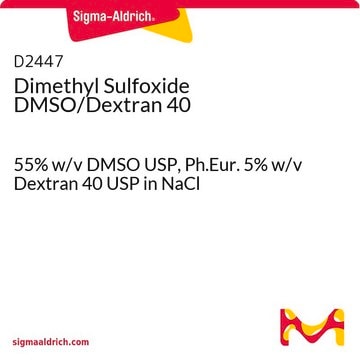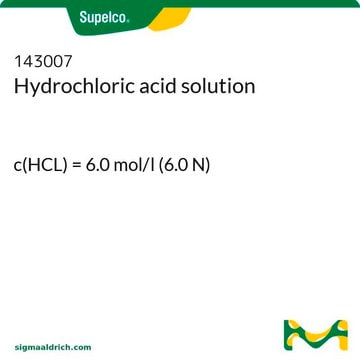H9892
Hydrochloric acid
1.0 N, BioReagent, suitable for cell culture
Synonym(s):
Hydrogen chloride solution
About This Item
Recommended Products
product name
Hydrochloric acid solution, 1.0 N, BioReagent, suitable for cell culture
sterility
sterile-filtered
Quality Level
product line
BioReagent
form
solution
concentration
1.0 N
technique(s)
cell culture | mammalian: suitable
anion traces
chloride (Cl-): passes test
SMILES string
Cl
InChI
1S/ClH/h1H
InChI key
VEXZGXHMUGYJMC-UHFFFAOYSA-N
Looking for similar products? Visit Product Comparison Guide
General description
Application
It can also be used:
- In the extraction of elderberry anthocyanins by endothelial cells.
- To convert iron(III) perchlorate to Fe(III) ions which can then form a complex with acetohydroxamic acid (FeAHA).
- to acidify the surface water sample and to prevent interference from carbonate concentrations up to 10 mg L-1 with organic carbon detector (OCD) detection
- to adjust the pH of complete transfection media for transfection with chitosan/pDNA nanoparticle complexes
- to prepare artificial tear solution (ATS) to incorporate the fluorescently tagged cholesteryl ester
Biochem/physiol Actions
Signal Word
Warning
Hazard Statements
Precautionary Statements
Hazard Classifications
Met. Corr. 1
Storage Class Code
8B - Non-combustible corrosive hazardous materials
WGK
WGK 1
Flash Point(F)
Not applicable
Flash Point(C)
Not applicable
Certificates of Analysis (COA)
Search for Certificates of Analysis (COA) by entering the products Lot/Batch Number. Lot and Batch Numbers can be found on a product’s label following the words ‘Lot’ or ‘Batch’.
Already Own This Product?
Find documentation for the products that you have recently purchased in the Document Library.
Customers Also Viewed
Protocols
Preparation from Packaged Powder, Preparation from Basal Salt Solutions, Banana Powder Preparation and Use, Coconut Water Preparation and Use
Follow our procedure for the determination of a chymotrypsin activity. This enzymatic assay of alpha chymotrypsin guides you through the entire process and necessary calculations.
Our team of scientists has experience in all areas of research including Life Science, Material Science, Chemical Synthesis, Chromatography, Analytical and many others.
Contact Technical Service




